Lichess4545 Ledger 070
Lichess4545 Ledger
Issue #070 - July 18, 2018
State of the 4545 League
by @SpiteKnight
Three teams are on the highest possible 4 match points. Sac It and See lead the pack due to their highest game points and suave nature. Meanwhile only three teams are yet to register a point on board.
LoneWolf Open section is being led by @mole_creature with 5.5 points, followed by four participants with 5.0 points each, it's shaping up to be a very close few weeks ahead. @Tranzoo leads U1800 section on 5.5 points.
Weekly Stats
by @kraaft and @somethingpretentious
Stats for Season 13 Rounds 2:
- The fastest mate was white on move 20 found in Gamelink White: outdoortree, Black: dose7781.
- The fastest draw was on move 35 found in Gamelink White: grzybozbur, Black: outerheaven92.
- The fastest resign was white on move 7 found in Gamelink White: joecupojoe, Black: deaarthur.
- The biggest upset was 129 points in Gamelink White: mn8, Black: badplayer_cm.
- The longest game ended with white on move 91 Gamelink White: ryune, Black: mole_creature.
- 145 was the highest ACPL in Gamelink White: joecupojoe, Black: deaarthur.
- 5 was the lowest ACPL in Gamelink White: abneric, Black: lalaze.
- Combined maximum ACPL was 204 in Gamelink White: kalandra, Black: perdhapley.
- Combined minimum ACPL was 27 in Gamelink White: vadsamoht, Black: roso97.
- The longest think was 21 minutes 47.0 seconds by 12 in Gamelink White: supermaths, Black: axp156.
- The most time left was 65 minutes 56.0 seconds in Gamelink White: anarschi, Black: ben_dubuque.
- The most time spent was 104 minutes 49.0 seconds in Gamelink White: ryune, Black: mole_creature.
Stats for Season 11 Round 6:
- The fastest mate was black on move 18 found in Gamelink White: player115, Black: fismoluni.
- The fastest draw was on move 15 found in Gamelink White: vacuum_cleaner, Black: lostearthworm.
- The fastest resign was black on move 16 found in Gamelink White: quanlentpyke, Black: sleepy_gary.
- The biggest upset was 201 points in Gamelink White: jitre, Black: tranzoo.
- The longest game ended with black on move 73 Gamelink White: joecupojoe, Black: simon-w.
- 172 was the highest ACPL in Gamelink White: scacchistaimbruttito, Black: jckund.
- 7 was the lowest ACPL in Gamelink White: vacuum_cleaner, Black: lostearthworm.
- Combined maximum ACPL was 291 in Gamelink White: scacchistaimbruttito, Black: jckund.
- Combined minimum ACPL was 20 in Gamelink White: vacuum_cleaner, Black: lostearthworm.
- The longest think was 19 minutes 47.0 seconds by 11 in Gamelink White: xag, Black: pioki.
- The most time left was 51 minutes 38.0 seconds in Gamelink White: joecupojoe, Black: simon-w.
- The most time spent was 58 minutes 32.0 seconds in Gamelink White: xag, Black: pioki.
Rapid-battle
Stats for Season 2 Week 4 to 6:
- The fastest mate was black on move 24 found in Gamelink White: tranzoo, Black: colwem.
- The fastest draw was on move 34 found in Gamelink White: erinyu, Black: scrooge.
- The fastest resign was white on move 17 found in Gamelink White: badplayer_cm, Black: mn8.
- The biggest upset was 132 points in Gamelink White: scrooge, Black: erinyu.
- The longest game ended with black on move 63 Gamelink White: jughandle10, Black: tnan123.
- 150 was the highest ACPL in Gamelink White: badplayer_cm, Black: mn8.
- 20 was the lowest ACPL in Gamelink White: tranzoo, Black: colwem.
- Combined maximum ACPL was 240 in Gamelink White: badplayer_cm, Black: mn8.
- Combined minimum ACPL was 50 in Gamelink White: erinyu, Black: tomek188.
- The longest think was 7 minutes 2.0 seconds by 11 in Gamelink White: badplayer_cm, Black: mn8.
- The most time spent was 24 minutes 8.0 seconds in Gamelink White: jughandle10, Black: tnan123.
Chess Puzzles
by @forhavu and @kraaft
Click on the images for the solution.
| pauix (1669) - izzie26 (1644) Gamelink. ◯ White to play. 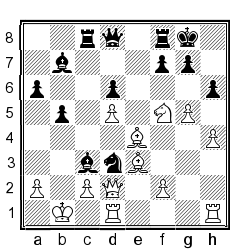 |
Lelouch_Vi_Brittania (2164) - s2004k1993 (2161) Gamelink. ⚫ Black to play. 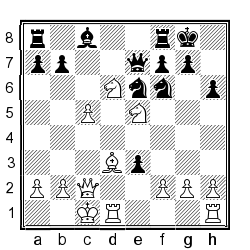 |
PatzerNacional (2006) - WhiteD4ath (2000) Gamelink. ◯ White to play. 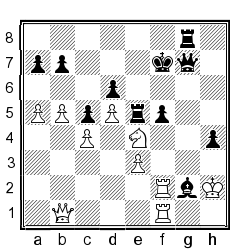 |
|
| lakinwecker (1717) - okei (1905) Gamelink. ⚫ Black to play. 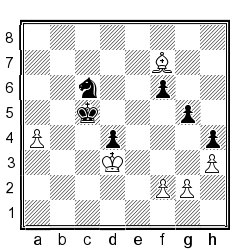 |
dorhinj1 (1884) - rampichino (1806) Gamelink. ⚫ Black to play. 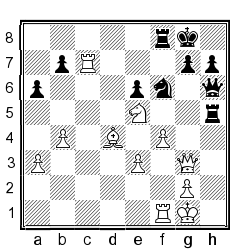 |
chesspibito (1699) - rsava (1410) Gamelink. ◯ White to play. 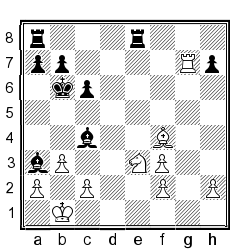 |
|
|
Rapid |
|||
| colwem (1514) - Tranzoo (1412) Gamelink. ⚫ Black to play. 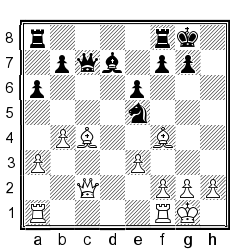 |
|||
Chessboard images provided by lenik terenin.
INTERVIEW WITH @hicetnunc
by @SpiteKnight
@hicetnunc has been a constant participant in the League for the past 7 seasons and has contributed greatly in getting rid of cheaters from both, the League and the online pool. He has exposed some strong and famous players too and always held his own even when he was doubted. Below is an interview with his thoughts on the subject of cheat-detection. I hope you enjoy reading his response as much as I did, it was really insightful.
INTERVIEW
Before we begin, would you like to tell us a little about yourself?
Sure, I’m a French guy, 45 y.o., father of 3, and I’ve been enjoying OTB chess for over 25 years now. My current OTB rating is 1950 FIDE.
You’ve been a strong anti-cheat advocate in online chess and have gone to great lengths to conduct independent research and collect data as evidence against cheaters. What got you interested in this pursuit? Was there any personal experience that motivated you to do this?
I have the feeling cheaters do harm on many levels and should be fought:
a) at the very least you’re losing your time playing them; those who say that you’re learning from a stronger player should ask themselves why even top GMs don’t play against Stockfish for training (hint: they’re too strong and don’t play like humans). If you spend 2-3hrs playing your game + preparation, that’s a fairly large chunk of your free time;
b) more importantly, the cheaters can cause some kind of psychological damage, ranging from self-doubt and loss of confidence to complete withdrawal from the game. No matter how hard you try and how hard you work, the cheater can basically decide the outcome of the game and even how he will proceed (either quick kill, or slow grind, or even the more sadistic version when the cheater throws some mistakes in before crushing you). As a consequence, some people will give up the game because they think they’re bad, or some others will turn away from joining a chess club/tournament and keep the chess culture alive. Worse even, some may decide to start cheating themselves, because they believe it’s the only way to fight…
c) which brings me to the 3rd point: a cheater is basically someone who has zero respect for his opponent as a person. He uses him/her as an object to satisfy his ego needs. Who wants to have this kind of people in their community? On top of that, some cheaters act as thieves, for example selling extra lessons on the basis of their online usurped “fame.”
These aspects are often ignored, as websites focus on the presumption of innocence, very worried about the consequences that an online ban may have on the poor cheater psychological balance, which I find funny as an online ban means basically nothing for most anonymous members.
Now back to your initial question, I guess I have a strong sense of justice (probably a family trait). My experience with online cheating started maybe 6-7 years ago when I noticed that the numbers of cheaters I was playing on Internet was on the rise (I used to play on chess.com). I was reporting left and right, but not much was happening, and I wasn’t sure why, because in my eyes the cheating was blatant most of the times. So I tried to learn more about the detection systems, and I realized not much had been done in this field. I was wondering why it was so difficult to detect online cheating, considering that engine play is vastly different from human play.
chess.com eventually decided to step up the fight against cheating and developed an in-house system, while appointing 1-2 employees to the task of detecting cheaters. It had some impact, but it soon became apparent that it was still impossible to play a tourney on their website without meeting cheaters. It was a very frustrating situation because though I successfully reported hundreds of cheaters to their team, I had no way to prove that I was able to spot them better than they do.
Then came Pgn-Spy in the summer of 2016, an open-source project developed by Mickael Gleason. Pgn-Spy is a customizable tool collecting data from games and providing various engine correlation scores as an output. I saw it as an opportunity to detect cheating in an objective and scientific way, and I’ve since developed my own detection system based on the tool.
How do you feel towards people who you suspect are cheating but have not been marked as cheaters yet?
I’d say “impatient” as the league mods can testify :) Sometimes I also feel a bit isolated when nobody sees what seems obvious to my eyes, but I guess it’s a question of perspective.
Nevertheless, I’ve contributed to the ejection of 28 cheaters from the league so far, so I’m confident the others will follow sooner or later.
Do you consider cheating in online chess to be a widespread problem that warrants concern or is the situation not that bad?
Well, it’s very common, but I’m not too bothered when it happens in blitz games for example. However, in a long games league, I consider this a major nuisance, because of the time and energy you invest.
Last season, I’ve been paired twice against cheaters, and I think that’s a little too much. I have some friends who refrain from joining the league because they don’t believe anti-cheating measures are good enough. I’ve also played in other leagues in the past (ICC and chess.com) and they have been slowly ruined by cheater infestation. As the number of cheaters increase, other players first protest, and then leave (what else can you do?). That’s a pity, because these leagues offer a great opportunity to play interesting games against people around your level in a very convenient way.
Have you ever thought someone was cheating and found out they were not?
What happens sometimes is that I pick a lot of signals that lead me to believe that someone is probably cheating, but as I gather data, I realize it may not be the case. However, when I report someone, I no longer have any doubts left.
I can’t exclude that someone points a major flaw in my system and leads me to reconsider some of my conclusions, or that I find new examples of clean play that would force me to reassess what I believe to be humanly possible in chess, but in general I have a lot of confidence in my methods and I have large safety margins to avoid false positives.
Do you think competitive online chess will never be possible due to cheaters?
I think the current detection systems used by the major sites are not yet up to the task of detecting unfair play in money events (admittedly, this is more difficult because of the high level of the players involved). But I’m also convinced that with some effort and extra research it’s possible to ensure fair play in these events.
At the moment, the costs/benefits ratio of better detection systems is probably not good enough to justify serious work by pro websites in this area though. You have to keep in mind that for a commercial website like chess.com, whose business is volume-driven, banning tens of thousands of cheaters may have an impact on the bottom line, so it’s understandable they prefer to go with marketing claims such as “we’re very good at being certain” (sic), and let cheaters run free.
Have you ever encountered cheating in your OTB experience? And is there a story to it?
Not directly. There are some sad stories of course. For example, in France we had the Feller/Hauchard case, and at amateur level, there’s this story of a guy who won an open tournament in Paris while wearing a coat and a wig all the time despite the summer heat. But I’m rather lucky to live in an area where OTB cheating seems to be very rare.
How difficult is it to detect a cheater?
Well, in most cases, it’s not very difficult. You probably don’t even need any sophisticated tools. If you look for example at lovlas’ recent game in the league and read the chat, it’s pretty apparent that he knew what was going on during the game.
This is not surprising, as human chess is based on pattern recognition, and experienced players quickly sense when a move ‘doesn’t fit’ – i.e. doesn’t follow common patterns. Now of course, a couple of strange moves aren’t enough to label someone a cheater, so it’s better to look for hard evidence: that’s where various measures of engine correlation levels can be used.
Finally, what’s difficult is to find a good balance between efficiency (removing cheaters) and dealing with the risk of false positives (removing innocent players). At the moment, I believe most systems are a bit too much on the cautious side. I’ve developed my approach to be able to detect cheaters faster without increasing the risk of false positives.
What do you hold as a minimum standard before accusing a player of cheating?
I share my suspicions with the mods early, but I report to lichess only if my system gives at minimum 99% confidence. In most cases, the confidence level is much higher than this though (last banned cheater as I write these lines I had at 99.993% confidence). The numbers also don’t include a couple of more intangible elements (such as prevalence of “strange” moves as noted above, or style of play in some endgames, etc.).
Do you think the current methods and standards of cheat detection employed by sites like lichess.org and chess.com are adequate at dealing with the problem?
I don’t know the inner workings of these systems, but my feeling is that they have been primarily designed with blitz cheating in mind and that they are probably not optimized to detect cheating in long games, which can take numerous forms. There are many avoidance strategies which are much easier to implement in a long game than in blitz, such as selection of inferior moves, handicap mode, artificial use of time, or throwing blunders here and there.
Now it would be unfair to put lichess’ and chess.com’s detection system in the same basket, as I’ve found the latter to be utterly disappointing over time. At least you don’t have to wait one full year for a suspect to be banned on lichess! :)
Have you received any backlash for accusing someone for cheating? If yes, how did you deal with that?
Yes, I’ve been called a bunch of names :) but I’m more concerned by the lack of action of the people in charge than by the anger of the banned players.
How has your overall experience with 4545 been? And is that experience heavily influenced by the presence of cheaters that we encounter sometimes?
The league is very well run and organized. I’d be grateful if the number of cheaters could be kept under 1/16 on top boards though and if they were banned quicker too.
Do you have any ideas or suggestions towards the chess community on how to deal with people who cheat?
First always report to lichess, and then drop me a DM if you wish.
Also don’t ever doubt your ability if you’ve badly lost an Internet game. It happens. What’s important is to keep your love for chess intact.
Finally if you’re very concerned about cheaters, give OTB chess a try. It’s great!
A lot of very interesting information there! I really enjoyed your views towards people who cheat and I hope to join you in being vigilant towards the same. Thank you for taking up an important fight because cheaters do sour the experience of this game and the League. You also have some really high standards of dealing with this issue, which is really appreciated as you approach this with responsibility. Thank you for answering all my questions, and volunteering to tell us all about your experiences.
Please feel free to join #lichessledger on slack if you would like to contribute towards the ledger in any way, or provide any feedback. Both are highly encouraged and appreciated. Thank you for reading.
Lichess4545 Ledger #070 ©2018 by Thienan Nguyen is licensed under a Creative Commons Attribution-NonCommercial-ShareAlike 4.0 International License
Thanks to @forhavu, @hicetnunc, @kraaft, @luvgangster, @somethingpretentious and @spiteknight.


